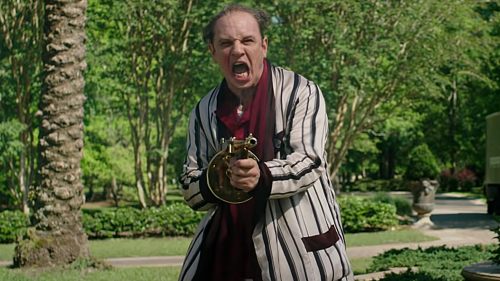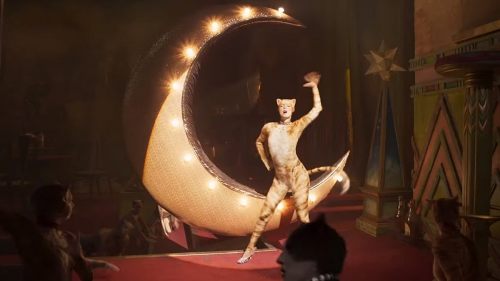Cannes 2018 Review: THE HOUSE THAT JACK BUILT Is an Existential Odyssey of Murder
There’s a void at the center of Lars von Trier, and he doesn’t know how to fill it. We know this because he’s told us so, on more than one occasion: in his last feature, the supersize carnal carnival Nymphomaniac, the intrepid Joe begs her increasingly extreme sexual partners to “fill all [her] holes,” a plea for satisfaction that starts between her legs and goes all the way down to her soul. Where that film posited the pursuit of an elusive orgasm as futile existential searching, the latest effort from The Notorious L.V.T., the serial-killer thriller The House That Jack Built, suggests murder as a more ambiguous means to a more ambiguous end. It is no longer enough to merely get off; to find inner peace, Von Trier now must escape his own shadow.
He explains himself in one of the many, many metaphors testing the audience’s patience like the tensile strength of a cathedral’s joist beam. For von Trier, as with his OCD-stricken sociopath protagonist Jack (Matt Dillon, doing a rather convincing impression of a functional human being), life is a series of pain mitigations. Jack compares his mental state to a figure walking between streetlights, the pleasurable shadow in front of him receding as the displeasurable shadow behind him grows, until he can make it to the next juncture.
The frame story — a discussion with the poet and Dantean guide Virgil (Bruno Ganz) as he leads Jack to a Bosch-styled hell — woven into a five-part structure recalling a handful of particularly creative slayings is chockablock with lofty analogies such as this. Suffering is kind of like the poetry of William Blake, and it’s kind of like architecture, and it’s kind of like the great oak tree sprouting in the center of the Buchenwald concentration camp, and it’s kind of like dessert wine, and it’s kind of like the etiquette of polite hunting. That Virgil states how tiresome this all is provides the key hint of self-awareness, a sign that von Trier intends to continue the frank yet symbolic introspection he began with Joe’s descent into degradation. I’d be hard-pressed to name another filmmaker as conscious of and uncomfortable with his own shortcomings.
It’s not for nothing that Nymphomaniac and The House That Jack Built, clearly twinned films in their ambitions and methods, are von Trier’s first efforts since kicking his addictions to drugs and alcohol. This film is the product of a frustrated man, a destructive man both inward and out, a man fundamentally at odds with his own well-being. When deeply depressed people fall back on vices to spackle over their voids, and when they undertake the brutal process of shedding them, they do problematic things. They say dumb shit. Jack offers this rationale for his own behavior, and duly, Virgil rejects it as an easy excuse. He’s right, too; to forgive the acts of gross sadism on display in this film, from the mangling of a child’s face to a crude double mastectomy, would be facile if not totally irresponsible.
But believe it or not, it’s possible to make an attempt at understanding without condonation. It’s a rare and often unsettling experience to watch someone muscle through the ugly, imperfect work of therapy, and von Trier has splayed his innermost demons all over the screen like so much blood spatter. Maybe, one day, he’ll find the self-knowledge he’s looking for, the intimately personal answer as to what makes the provocateur act out. Until then, it’s one more fuck, one more kill, one more movie. Just one more…



